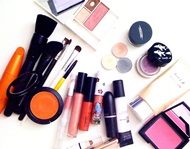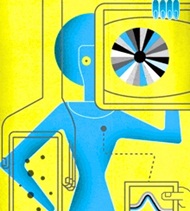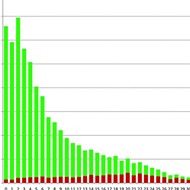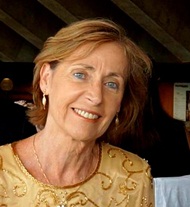HomeTalking Points
Talking Points
More fruit and veggies may protect smokers against COPD
For current and former smokers, eating more fruits and vegetables may lower the risk of developing chronic obstructive pulmonary disease or COPD, a Swedish study...
Positive changes in the brains of retreat participants
More Americans than ever are turning to spiritual, meditative and religious retreats as a way to reset their daily life and enhance wellbeing. Now...
Trial to test dogs' ability to detect bowel cancer
A Daily Express report says Medical Detection Dogs has been given the green to begin the first colorectal cancer trial in the UK using...
Little or no weight gain from light to moderate drinking
Despite thousands of studies spanning decades, Jane Brody writes in The New York Times that alcohol remains one of the most controversial and confusing...
Ebola nurse's death to be investigated among claims of treatment being refused
The 2014 West African Ebola outbreak killed 11,310 people. Liberian nursing assistant Salome Karwah was not one of them. The disease that tore through...
Implications stemming from evolving definitions of 'safe sex'
Evolving definitions of what is ‘safe sex’ has implications for treatment as prevention and pre-exposure prophylaxis (PrEP), says Martin Holt of the University of...
Oxford college accused of 'lending credibility to quackery'
An Oxford University college has been accused of inadvertently 'lending credibility to quackery' by agreeing to host a conference on the 'alternative therapy' of...
Time to encourage safer alternatives to smoking – tobacco control expert
The regulation of tobacco and nicotine products has become less straightforward, writes David Sweanor, an adjunct professor of law at the University of Ottawa...
Academics who were challenged by Noakes' respond in SAMJ
Academics from the universities of Cape Town and Stellenbosch who were criticised by low carb-high fat champion Prof Tim Noakes for advocating a balanced diet,...
100 years later: Controversy still clouds the Rorschach test
The open-ended Rorschach inkblot test has survived a century of controversy and scorn. Is it hocus-pocus pseudo-science or does it have a role to...
Trump's policies set to damage health and science, journal warns
The BMJ warns in an editorial that US President Donald Trump’s administration 'is acting in ways that will suppress research and limit communication on scientific...
HIMI: Need for accessible info for healthcare service comparisons
Fear of public hospitals, high medical bills and family responsibilities are often the underlying motives for those who become medical aid members. Furthermore, there...
Africa needs to look at best practice elsewhere – Novartis SA CEO
The successful expansion of services for HIV/Aids, TB and malaria has highlighted the inadequacy of existing services to deliver interventions for other health needs,...
Current antibiotics guidance is wrong, argue some
It's the accepted position: If taking antibiotics, don’t stop taking them until the pill vial is empty, even if you feel better. But the...
Obamacare repeal will impact on mental health and addiction Tx
The debate over the fate of Obamacare has focused on the lifesaving care brought to people with cancer, diabetes, and other physical illnesses. But...
Cannabis oil: 'Dangerous and unsubstantiated claims being made'
Like most people who value individual freedom from government regulation, columnist Ivo Vegter writes in the Daily Maverick that he approves of the worldwide...
Need for more pragmatism over drug use – SA expert
There is a strong need for greater awareness of pragmatic, inclusive approaches to drug use – which are proven to reduce the negative consequences...
Rural doctors bedevilled by politics
Mseleni Provincial Hospital is in the sticks in a distant corner of northern KwaZulu-Natal, yet this remote state hospital is renowned in specialist medical...
New ACP guidelines on how best to treat gout ignites bitter battle among physicians
A bitter battle has broken out among physicians about how best to treat gout, following new guidelines from the American College of Physicians that...
How Iceland engineered the cleanest-living teens in Europe
The Icelandic model, which has turned around the drug and alcohol behaviour of its troubled teens, could benefit the general psychological and physical wellbeing of...
Harvard dispute over whistleblower allegations turns nasty
A bizarre conflict between a mentor and his student spiralled dramatically out of control, damaging the reputation of a prominent scientist and Harvard University,...
Anti-vaxxer Trump may tap anti-vaxxer Kennedy for panel on vaccination safety
US President-elect Donald Trump opened up a new front in his war on science, according to a Boston Globe editorial, when he appointed –...
Clinical trial with 'young blood' to slow ageing is labelled a 'scam'
A pay-to-participate private clinical trial on the potential of 'young' blood plasma from teenagers and young adults can reverse certain of the hallmarks of...
Research shows superiority of US female doctors
Female physicians tend to provide higher-quality medical care than males, according to Harvard research. And if male US doctors were as adept as females,...
First female doctor in the UK spent 56 years disguised as a man
Dr James Barry, an Irish surgeon who served in the Cape Colony in the mid-1800s, and is credited with a number of medical innovations...
Debate on long-term psychiatric drug use
The benefits of psychiatric drugs have been exaggerated and the harms underplayed due to poor trial designs, argues one expert. But another expert and a patient contend that the evidence supports the use of these drugs, in a debate on the pages of The British Medical Journal.
New guidelines on life-prolonging treatments
The American Thoracic Society aimed has released new guidelines for crucial decision-making for the care of patients with advanced critical illness while preventing conflicts between medical staff and family caregivers.
The pseudoscience of beauty products.
 The beauty industry is massive, a huge cultural force in a tight, symbiotic relationship with celebrities and the celebrity-oriented media. So by its very nature, it creates massive problems for anyone seeking to get to the truth about the products it makes and promotes, writes Prof Timothy Caulfield of the School of Public Health at the University of Alberta, in The Atlantic.
The beauty industry is massive, a huge cultural force in a tight, symbiotic relationship with celebrities and the celebrity-oriented media. So by its very nature, it creates massive problems for anyone seeking to get to the truth about the products it makes and promotes, writes Prof Timothy Caulfield of the School of Public Health at the University of Alberta, in The Atlantic.Dr Google may trigger ‘cyberchondria'
 Major search engines are providing irrelevant information that could lead to incorrect self-diagnosis, self-treatment and ultimately possible harm, research has found.
Google reports that one in 20 of its 100bn searches a month was for health-related information. Some 35% of US adults go online to self-diagnose a medical condition.
Major search engines are providing irrelevant information that could lead to incorrect self-diagnosis, self-treatment and ultimately possible harm, research has found.
Google reports that one in 20 of its 100bn searches a month was for health-related information. Some 35% of US adults go online to self-diagnose a medical condition.Debate around 'excited delirium' diagnosis
Police, medical examiners and some doctors say 'excited delirium' is real and frightening, reports the Washington Post.
Influenced by mental illness or the use of such stimulants, those in its grip often have extraordinary strength, are impervious to pain and act wildly or violently. Then, suddenly, some die. But others say it is merely a cover for the use of excessive force by law enforcement.
Münchausen by internet — how one woman fooled millions
 Australian blogger Belle Gibson has been exposed for fabricating a tragic cancer story that brought her fame and riches: various publishing contracts and large donations to a ‘charity’ which she plundered. But Gibson’s strange behaviour is not that unusual – faking disease in return for online fame is now a recognised medical condition.
Australian blogger Belle Gibson has been exposed for fabricating a tragic cancer story that brought her fame and riches: various publishing contracts and large donations to a ‘charity’ which she plundered. But Gibson’s strange behaviour is not that unusual – faking disease in return for online fame is now a recognised medical condition.Concerns over 'deprioritising' of medical research
Concerns are being raised over new models of medical education in the US in which research plays a minimal role, as being likely to create a two-tiered system of education, decrease the physician-scientist pipeline and diminish the application of scientific advances to patient care.
'You can't outrun a bad diet' – BMJ experts
Regular exercise is key to staving off serious disease, such as diabetes, heart disease, and dementia, write experts in an editorial in the British Medical Journal, but calorie laden diets now generate more ill health than physical inactivity, alcohol, and smoking combined.
ER doctor grieving
 It’s grainy, it’s blurred. But a paramedic’s touching photograph of a Californian ER doctor doubled over, taking a moment to compose himself after losing a 19-year-old patient, has gone viral.
‘Hearing that a family member has died is such an awful and wrenching experience for the relative that it's easy to forget the emotional toll that must be taken by doctors sharing the news,’ wrote The Independent, London. Qatar Day wrote ‘It's easy to forget the incredible work doctors are doing every single day.’
It’s grainy, it’s blurred. But a paramedic’s touching photograph of a Californian ER doctor doubled over, taking a moment to compose himself after losing a 19-year-old patient, has gone viral.
‘Hearing that a family member has died is such an awful and wrenching experience for the relative that it's easy to forget the emotional toll that must be taken by doctors sharing the news,’ wrote The Independent, London. Qatar Day wrote ‘It's easy to forget the incredible work doctors are doing every single day.’‘White plasma’ — commercialising breast milk
 Breast milk, that most ancient and fundamental of nourishments, is becoming an industrial commodity, and one of the newest frontiers of the biotechnology industry — even as concerns abound over this fast-growing business, writes The New York Times.
Breast milk, that most ancient and fundamental of nourishments, is becoming an industrial commodity, and one of the newest frontiers of the biotechnology industry — even as concerns abound over this fast-growing business, writes The New York Times.Changing face of healthcare industry
 New entrants and established players are racing to create the next generation of medical products and services, writes Strategy+Business.
Increasing numbers of consumers are willing to abandon traditional care venues for more affordable and convenient alternatives. Many would choose at-home or retail options for more than a dozen medical conditions or procedures such as self-diagnosing ailments with kits.
New entrants and established players are racing to create the next generation of medical products and services, writes Strategy+Business.
Increasing numbers of consumers are willing to abandon traditional care venues for more affordable and convenient alternatives. Many would choose at-home or retail options for more than a dozen medical conditions or procedures such as self-diagnosing ailments with kits.Lessons from CROI 2015
 Dr Joel Gallant immediate past chair of the HIV Medicine Association, has spoken about five important lessons learned at the CROI 2015 conference on the prevention of HIV and the future clinical implications of some of the major studies that were presented, reports Healio.
Dr Joel Gallant immediate past chair of the HIV Medicine Association, has spoken about five important lessons learned at the CROI 2015 conference on the prevention of HIV and the future clinical implications of some of the major studies that were presented, reports Healio.30-day mortality: The pressure of statistics
 There is growing criticism of 30-day mortality as a measure of surgical success, writes The New York Times. 'That seemingly innocuous metric may actually undermine appropriate care, especially for older adult.'
There is growing criticism of 30-day mortality as a measure of surgical success, writes The New York Times. 'That seemingly innocuous metric may actually undermine appropriate care, especially for older adult.''Lie back and think of your career' – Ozz surgeon
 A senior surgeon in Australia has triggered controversy after telling junior female doctors to go along with sexual abuse at work for the sake of their careers.
A senior surgeon in Australia has triggered controversy after telling junior female doctors to go along with sexual abuse at work for the sake of their careers.Official NHS calculator predicts your heart attack
 Britain’s NHS has launched a controversial calculator which predicts when you will have a heart attack or stroke - and compares a person’s ‘heart age’ with their biological age. But some critics raised concerns about the accuracy of a 'blunt tool' which tells every Briton they will have a heart attack or stroke one day, when many will not, and raised fears that the tool could be used to push millions more people into taking medication.
Britain’s NHS has launched a controversial calculator which predicts when you will have a heart attack or stroke - and compares a person’s ‘heart age’ with their biological age. But some critics raised concerns about the accuracy of a 'blunt tool' which tells every Briton they will have a heart attack or stroke one day, when many will not, and raised fears that the tool could be used to push millions more people into taking medication.